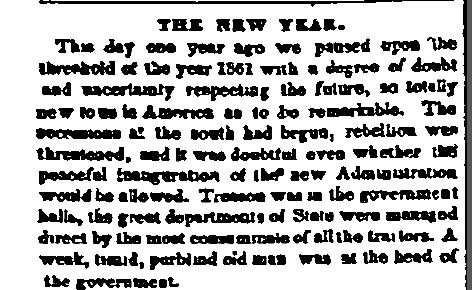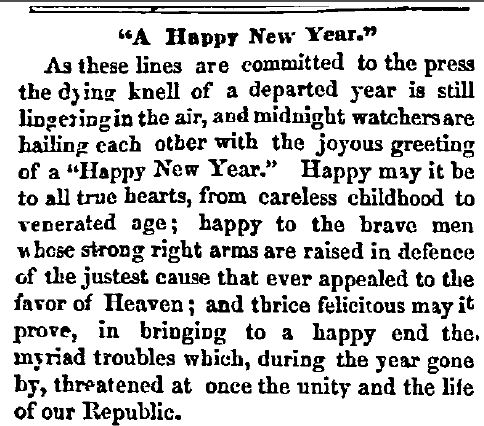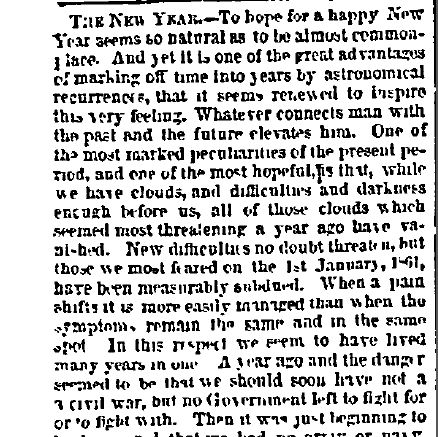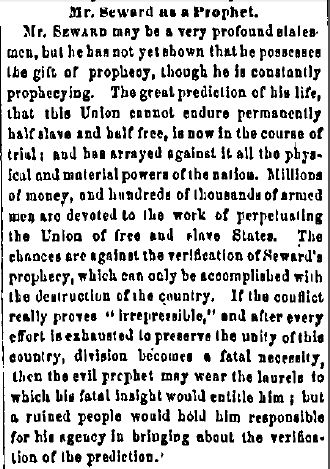New Year 1862
Posted By Norman Gasbarro on January 1, 2012
Happy New Year 2012, from Gratz, Pennsylvania.
A selection of editorial comments from Pennsylvania newspapers is presented here to show the mood in the state and nation at the start of the New Year 1862, 150 years ago!
First, from the North American and United States Gazette, 1 Jan 1862:
This day one year ago we paused upon the threshold of the year 1861 with a degree of doubt and uncertainty respecting the future, so totally new to us in America as to be remarkable. The secession of the south had begun, rebellion was threatened, and it was doubtful even whether the peaceful inauguration of the new Administration would be allowed. Treason was in the government halls, the great departments of State were managed direct by the most — of all the traitors. A weak, timid, — and old man was at the head of the government.
Yet even then we did not know half the extent of the danger, and now when we look back upon the field it seems wonderful that the plans of the conspirators, so ably contrived, and so well adapted to the emergency did not succeed. But the peril was passed. Despite all obstacles, the new administration was inaugurated, and the Departments steadily subjected to a purifying process which lent new vigor to the government. It was not like the ordinary change of personnel in our national government -it was as though we had to create an entire new government. The rebels had all the benefit of the money, arms, vessels, army and navy officers, while we did not know whom to trust, where to look for money, or what to touch first.
That out of this wreck we have recreated the great Republic, and made it stronger and greater than ever, is something of an achievement. But who, on the 1st of January, 1861, could have foreseen half of what we have experienced in this year? And now that we have gone through it, who, standing to-day on the threshold of the year 1862, can hazard a profecy as to the future of this country? That we may be beset by a new and greater peril is possible; that we shall be equal to them no one can doubt. One thing every patriotic heart will ardently look forward to – the downfall of the rebellion and the restoration of peace.
From the Philadelphia Inquirer, 1 January 1862:
As these lines are committed to press the dying knell of a departed year is still lingering in the air, and midnight watchers are hailing each other with the joyous greeting of a “Happy New Year.” Happy may it be to all true hearts, from careless childhood to venerated age; happy to the brave men whose rigid right arms are raised in defense of to the justest cause that ever appealed to the favor of Heaven; and thrice felicitous may it prove, in bringing to a happy end the myriad of troubles which, during the year gone by, threatened at once the unity and the life of our Republic.
This is a day sacred to Retrospect. It is the day of all others – except that which brings bitter memories to the bed of death – when the moral vision is most certain to be turned inward upon the soul. It is a day devoted to holy Resolution; for upon this day the penitent transgressor is most likely to renew his broken vow to lead a better life. It is a day, too, when the idle and prodigal, resolves that, in the day to come, he will see to it that he will have no future cause to “mourn over days misspent, and fair occasions gone forever by.” May all such resolutions, made to-day, attain the “consummation, most devoutly to be wished.”
It is a day, too, when the American patriot will turn a sorrowing eye along the troubled track of his country’s history since the dawn of the last new year. It was on that day that the Administration yielded its tardy convictions to the appalling fact that the streets of Washington were filled with traitors – that they were in the chambers of legislation and the high places of Government, plotting, not alone the segregation of individual States, but the seizure of the capital itself, and the utter subversion of Government, Constitution and all.
Since that day what once bright names have been consigned to an abyss of undying infamy! What glorious titles have been exalted to immortal honor! Within that year what national trials have been endured; what perils have been escaped; and what wonders have been accomplished by the aroused patriotism of the people of the land! These will be the themes of conversation to-day at every table and in every home. There we leave them, glad to have it in our power to repeat the poet’s words, that in spite of treason and rebellion, in in the midst of plots and counterplots, here in the free North, at least, “the holy stream of human happiness still rolls on.”
From the Public Ledger, 1 January 1862:
To hope for a happy New Year seems so natural as to be almost commonplace. And yet it is one of the great advantages of marking off time into years by astronomical occurrence, that it seemed renewed to inspire this very feeling. Whatever connects man with the past and the future elevates him. One of the most marked peculiarities of the present period, and one of the most hopeful, is that, while we have clouds, and difficulties and darkness before us, all of those clouds which seemed most threatening a year ago have vanished. New difficulties no doubt threaten, but those we most feared on 1st January 1861, have been measurably subdued. When a pain shifts it is more easily managed than when the symptoms remain the same and in the same spot. In this respect, we seem to have lived many years in one. A year ago and the danger seemed to be that we shall soon have not a civil war, but no Government left to fight for or to fight with. Then it was just beginning to be discovered that we had no army or navy, and that the few soldiers in Fort Moultrie had their hands so tied by the traitor Floyd, that Major Anderson had just done the only thing left possible for him to do, namely retired to Fort Sumter. Even this was complained of, and members of the Cabinet were threatening all sorts of things unless he was at once remanded.
Now there is certainly no lack of strength or energy or fear to assume constitutional power by the Government – no fear of quiet disintegration or dissolution into elementary states. Then there was no army. Now we have six hundred and fifty thousand men in arms, and most of them well drilled and capable of almost all that soldiers can do. Then the South had stolen all our arms and broken up the means of transportation. Now it is as if they had sowed the dragon’s teeth and not only men, but men ready armed and equipped, had sprung up in their places. Then we had no navy. Now we have the most formidable ever got together in so short a time. Then our credit was at the very lowest ebb. Clerks were stealing from the Treasury, and yet not enough could be borrowed to pay the most ordinary expenses. Now we can borrow hundreds of millions most easily and on better terms that we could borrow one million. We have, it is true, met with unfriendliness where we had calculated on finding firm and secure friends, but we entrust the estrangement is but momentary, and caused rather by misapprehension that any settled purpose of mischief. As when the mariner at sea is out of sight of land, and surrounded by cloud and tempest he — the more persistenly by the compass, ever pointing to the pole. So on entering the New Year we may do it with safety and success providing we are guided in public and private affairs only by the great laws of truth, justice and right, with the charity that thinketh no evil and the love that work — none. There is an invisible law of right and wrong running through all human actions. In proportion as we are guided by this we may begin the New Year in faith of a favoring Providence.
Finally, from the Harrisburg Patriot, a weekly in 1862, its first 1862 edition published on 2 January 1862.
Mr. Seward may be a very profound statesman, but he has not yet shown that he possesses the gift of prophecy, though he is constantly prophecying. The great prediction of his life, that this Union cannot endure permanently half slave and half free, is now in the course of trial; and has arrayed against it all the physical and material powers of the nation. Millions of money, and hundreds of thousands of armed men are devoted to the work of perpetuating the Union of free and slave States. The chances are against the verification of Seward’s prophecy, which can only be accomplished with the destruction of the country. If the conflict really proves “irrepressible,” and after every effort is exhausted to preserve the unity of this country, division becomes a fatal necessity, then the evil prophet may were the laurels to which his fatal insight would entitle him; but a ruined people would hold him responsible for his agency in bringing about the verification of the prediction.
At the commencement of this war, Mr. Seward again indulged his prophetic propensity by predicting with and air of careless levity that all this trouble would blow over in sixty days. This was the utmost limit he would give to rebellion. But sixty days, and more than twice sixty days have passed, and the rebellion is to all human appearance, more formidable than in the beginning. The veiled prophet maintains an air od profound foreknowledge, nevertheless. Not long since he intimated that some signal advantage would be gained within ten days – but twice ten days passed without bringing the promised victory.
The circular letter addressed to the Government of the States advising them to prepare against a foreign invasion, is now regarded in some quarters, as a remarkable evidence of the Secretary of State’s sagacity; but unfortunately for this claim the same letter gave the most positive assurance that a Foreign war was never less probable. Men were puzzled to understand Mr. Seward’s drift. There was no reason to apprehend war with England or France, yet it was necessary to make to most extraordinary preparations for war. But the Secretary had a mysterious way of doing his work – a profound and incomprehensible method. He foresaw that some difficulty would occur with England similar to the seizure of Mason and Slidell – that the British nation would be indignant at the insult offered their flag – that they would demand reparation and a humiliating apology, which our government could not grant without disgrace – that war would be declared, and that the defenses erected at his suggestion would come as handy as Mrs. Toot’s coffin. This certainly looks very creditable to the foresight of the Secretary of State; but he has the bad habit of spoiling his own predictions. From the inner recesses of the State Department there now precedes another prediction that there will be no war with England, and that the Trent affair will be amicably settled. How this is to be accomplished, whether by protracted negotiations, or a simple apology without surrendering the persons of the rebel envoys, or by abject submission and the return of Mason and Slidell, we are not permitted to know. We must rest satisfied with the assurance that Mr. Seward is placid and serene, and that war is not probable. Our confidence in the preservation of pacific relation would be greater is Mr. Seward had not predicted peace, or is a single one of his many prophetic announcements had been verified.
Editorial selections from the newspapers above are available from the on-line resources of the Free Library of Philadelphia.
 ;
;






Comments